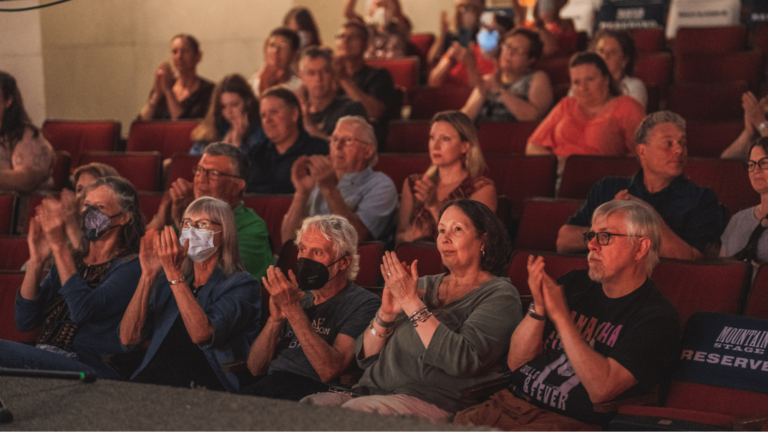Trying to persuade attendees to answer survey questions can be a bit like asking Tom Cruise not to perform his own stunts — mission impossible.
Considering the industry standard is a measly 10% response rate, we completely understand why only 23% of event creators use post event survey questions.
However, if you skip this vital step, you’ll miss out on the perfect opportunity to connect with your community and gather insights into their needs, preferences, and opinions.
Eventbrite supports a community of more than 800,000 event organizers who use our tools to track audience analytics to help them make each event bigger and better than the last. Here’s what we’ve learned: The key is to create an event-specific survey that speaks directly to your audience by choosing the right questions and keeping it short and sweet.
This article will show you how to do exactly that, with actionable tips on increasing engagement rates and a list of data-driven questions — along with a free downloadable template.
Let’s dive in.

Why generic post survey questions result in low-value data
Asking the wrong event survey questions is an easy mistake to make -– and by “wrong,” we mean those that may sound valuable but, in reality, don’t give you constructive feedback.
The wrong post event questions focus on recapping the event, but lack any underlying objective. For example, imagine if Crowded Functions ATL, who hosts wild parties, asked attendees “How was your night on a scale from 1-10?”
At first glance, this question seems like a good way to gauge attendee satisfaction. But Crowded Functions ATL events take place at popular nightclubs, with various elements that make them outstanding, such as themed decorations, awesome DJ sets, lighting shows, and inspired cocktails.
So even if the majority of attendees voted 10, it would still leave Crowded Functions ATL with a heap of unanswered questions about what specifically contributed to their positive experience and what could be improved for future events.
That’s why it’s so important to start asking the right questions that unlock the specific desires and experiences of your community.
How to ask questions that provide high-value data
At Eventbrite we measure our performance by our Net Promoter Score (NPS). Your NPS is a powerful metric that tells you how many of your customers are “promoters” — or, put another way, brand advocates — and enables you to track your progress over time.
To get your NPS score, you ask a question like this:
“How likely are you to recommend our events to others?”
Respondents answer with a number between 1 (unlikely) and 10 (very likely). Depending on their answer, each respondent is categorized as either a detractor (0-6), a passive (7-8), or a promoter (9-10).
To calculate your NPS:
- Enter your survey responses into a spreadsheet
- Categorize responses as promoters, passives, or detractors
- Add the responses from each category
- Divide each group total by the number of responses in each category to get a percentage
- Subtract the percentage of detractors from the percentage of promoters — that’s your NPS
If your NPS score is between -100 and 0, you’ve got some work to do. If you’re in the 0-30 range, you’re doing fine; an NPS between 30 and 70 is great; 70-100 is excellent. You can even use your NPS score to compare yourself to your competitors. According to SurveyMonkey benchmark data, the average NPS score is 32.
As valuable as your NPS is, it’s just one type of feedback. Once you ask the initial question, you’ll want to ask follow-up questions to gain more qualitative information that will help you improve your score (and your future events).
Want to increase engagement with your events?


The 3 best question types to use in post event surveys
To gauge event success, you need to use a combination of question types that do two things at once: collect specific enough data to form cohesive answers and give attendees a chance to truly reflect on how they feel about your event.
These are the top three types of questions we use to gather valuable feedback in post-event surveys.
1. Matrix scale questions
Matrix or Likert scales are a valuable tool for collecting targeted feedback from event attendees and identifying areas for improvement.
Matrix scales:
- Are easy to understand and interact with
- Provide standardized response options
- Give attendees a range of options
Matrix scales can work for post event surveys by asking respondents to tick the box they feel most accurately represents their feelings toward your event, ranging from extremely satisfied to extremely unsatisfied.
📋Example question: How likely are you to attend another event we host?
2. Rating scale questions
Number rating scales (like NPS) are well suited to post event survey questions as they help make answering a quick and easy process. Recipients are much more likely to select an option from a dropdown, click a radio button, or tick a score box than write out free-form text — especially if they’re filling out your survey questions on a mobile device.
Number rating scales:
- Provide quantitative data that is easy to interpret
- Can be used for a variety of questions
- Help you easily track changes over time
Form fields that provide definitive data points — such as checkboxes, lists, number fields, and rating scales — are much easier to analyze than extensive written feedback. Turn them into charts or graphs for better overall visibility of your event’s performance.
📋Example question: Please rate the quality of the food at the event on a scale of 1-5.
3. Open-ended questions
Open-ended questions can be a bit risky as they rely on attendees to type in an answer, which requires a bit more effort. This can increase the likelihood of survey opt-outs. However, enthusiastic attendees are more likely to provide actionable insights and suggestions, making open-ended questions the most precious data event creators can receive in post event surveys.
Open-ended questions:
- Uncover new ideas and suggestions from attendees
- Allow more personalized answers
- Help build stronger relationships with individual community members
To improve the quality of responses and decrease the chance of attendees not answering, make sure that the open-ended question doesn’t require more than a few words by setting a word limit.
📋Example question: What was your favorite part of the event, and why?

30 post event survey question ideas for different event types
Now that you understand how to approach post event surveys and which types of questions to include, it’s time to put this knowledge into practice. The event survey questions you choose should be based on your target audience, the type of event, and a clear objective.
Here are some ideas to get you started.

Live music events
When creating a post event survey for live music events, try to relate the questions to specific event elements that music lovers would notice. Avoid asking generic or vague questions, such as, “Did you enjoy the show?”’ and instead dig a bit deeper about attendees’ experience related to things like the event venue, audio quality, merchandise, and security.
- How would you rate the overall atmosphere and energy of the event on a scale of 1-5?
- How likely are you to attend this event again in the future?
- How would you rate the overall quality of the sound at the event?
- Did you feel that the event provided adequate security and safety measures?
- Did the venue space meet your expectations? Why or why not?
To create a more engaging post-event survey, use your unique style to add humor or inside jokes with your audience. For example, Stereo Live Dallas, a live music venue that hosts electronic music events, might infuse their questions with a bit of punk-rock attitude.
Here’s an example of how they could approach a question:
❌ Did you like the performers at the event?
✔ How dope were the performers on a scale from 1-5, with 1 being “nah, dog” and 5 being “my mind was completely blown”?
Business and professional events
Post event surveys for business and professional events should focus more on whether attendees believe they received tangible value from the experience rather than focusing solely on enjoyment.
- How would you rate the quality of the presenters at the event on a scale from 1-5?
- Did you feel that the event provided adequate networking opportunities?
- Do you feel the workshops offered enough value and professional insights?
- How likely are you to recommend this event to an emerging business person?
- Were enough refreshments provided throughout the event?
When creating survey questions, try to use clear and specific language, and focus on the outcomes and benefits of attending the event. For example, IIDA NY hosts events such as volunteer fairs and study groups that focus on professional development and networking.
Here’s an example of how they could approach a question:
❌ Was the information provided up to scratch?
✔ How helpful was the information shared by the presenters in increasing your understanding of the topic?

Food and drink events
Food and drink events are unique experiences that people often partake in as a fun hobby or as a night out. As they’re centered around food, the questions you ask will also revolve around the quality of the food they ate as well as their overall enjoyment of the night.
- Did you feel the event provided enough options for food and drink?
- In your opinion, was the event experience a good value for the price of your ticket?
- How satisfied were you with the vegan and vegetarian options provided?
- How would you rate the quality of the food?
- On a scale of 1-5, how much did you enjoy the cheese-making experience?
Food and drink events are intimate events, so don’t be afraid to use customized questions that add a bit more of a personal touch. For example, Murray’s Cheese creates cheese pairing and cheese-making classes.
Here’s an example of how they could approach a question:
❌ Did you enjoy the wine and cheese?
✔ What was your favorite wine and cheese pairing of the evening?
Performing and visual arts
For a performing or visual arts event, it’s a great idea to use post event survey questions that relate to featured acts as well as the venue you partnered with. This can help you decide what venues and acts to work with in the future and how to make your event more engaging.
- How likely are you to post about the event on social media?
- Do you feel it was worth coming out tonight to watch this show in person instead of on the screen? Why or why not?
- Was there enough time during intermission to get a snack or drink or go to the bathroom?
- What were your favorite/least favorite acts?
- How would you rate the quality of the venue and facilities, such as the restrooms and parking?
Keep in mind that you don’t want only to ask questions about the quality of an act. It isn’t particularly useful for you to know your attendees’ review of a local artist.
Take for instance, Capital Laughs, an independent comedy production organization in Washington, DC, that regularly hosts stand-up comedy nights. Instead of wasting their survey questions asking about specific acts, they should focus on the quality of the event overall, as this is something they can control in the future.
Here’s an example of how they could approach a question:
❌ How would you rate each performer on a scale of 1-10?
✔ Did the event not meet, meet, or exceed your expectations?

Charity and nonprofit events
Creating impactful surveys for charities and nonprofits is a fantastic way to understand how attendees respond to your events and identify areas for improvement.
Most people who attend charity events are looking to give back to their community and support a cause they care about. Therefore, your questions should focus on whether they felt their time was well spent.
- How likely are you to follow us on social media after the event?
- How satisfied were you with the amount of complimentary inclusions?
- How likely are you to recommend this event to a friend?
- Do you feel that you better understand the issue after the event?
- Did you experience boredom at any stage during the event? If so, when?
When developing your post-event survey questions, remember that attendees have already given up their time to support your cause, so you want to make them feel appreciated.
A small difference in wording can lead to higher conversion rates. For example, Irreverent Warriors creates events that promote humor and fun to help support the mental health of veterans.
Here’s an example of how they could approach a question:
❌ Will you donate more money to our cause in the future?
✔ Would you suggest to a friend that they donate to our cause?
Sports and fitness
Sports and fitness events allow attendees to challenge themselves physically and mentally. Therefore, your post event survey questions should not only address the overall event quality, but the personal attendee experience as well.
- How would you rate the quality of the field on a scale from 1-5?
- Did you feel that you could easily track your progress on the day?
- In your opinion, were there enough safety measures in place, and were they properly explained?
- How interested would you be in a re-match?
- Did you feel that the game rules were fairly and evenly applied?
Don’t ask for feedback on things you can’t control. Instead, focus on elements that you can improve on in the future. For example, Dr. Jordan Metzl hosts group yoga sessions that help promote health and well-being, as well as social connection, through exercise.
Here’s an example of how he could approach a question:
❌ Did the weather impact your enjoyment of the event?
✔ Would you prefer the sessions to take place outdoors or indoors?

How to increase post event survey engagement rates
As we all know, increasing post-event survey engagement rates can be a challenge. However, there are several strategies that event creators can use to encourage attendees to participate and provide honest answers.
1. Keep it short and straightforward
Figure out the feedback that will be most valuable and keep questions to an absolute minimum. A maximum of 10 questions will ensure the highest completion rates.
Assume that your recipient is as busy as you are. Because their time is precious, be upfront about how many questions are in the survey and how long it will take. They’re much more likely to complete a survey that takes two minutes than one that takes 10 minutes — no matter how engaged they are.
2. Compare against your competitors
Looking at industry averages lets you compare how you’re doing against your competitors. For example, if your event scored 70% for organization, how would you know if that was good or bad?
Benchmarking your performance against data obtained from similar event surveys can provide valuable insight into how your event stacks up against similar events in the industry.
You’ll be able to identify areas where your event excels and falls short versus your competitors, helping you make data-driven decisions to improve future events. Plus, it can help you stay up to date with industry best practices so your events become known as market leaders in future.
3. Send it quickly
To get the best possible response rate, you need to act fast. Send your main event survey within 24 hours of the event to capture attendees while they’re still engaged, and everything is fresh in their minds.
Create your questionnaire well in advance to ensure it’s ready. Post event surveys provide valuable data that you can use to justify future investment.
4. Make respondents feel valued
Give event attendees a reason to answer your post event survey questions. Tell them how important their feedback is to you, and then prove it!
For example, you could offer a discount or free gift in exchange for taking the survey, or enter respondents into a drawing for a giveaway.
5. Time it right
According to SurveyMonkey data, survey recipients are more likely to respond between the hours of 9 and 10 am and 2 and 3 pm on a workday.
By sending your online survey at a time that’s convenient for them — i.e., when they’re already sitting at their computer — you can increase your response rate. The more data you can get, the better!
Start your post-event survey
Specific and relevant post event feedback from attendees is the best insight you can get when assessing your event success and areas for improvement.
Remember your survey questions need to have enough breadth and depth to keep your audience engaged with the process and give you valuable, actionable insights about your event.
Just remember to show your audience how much you value their responses — and keep the questions short.






